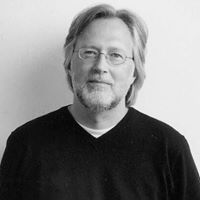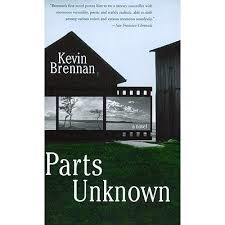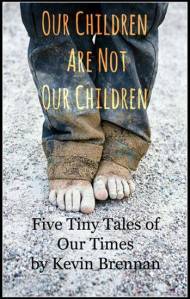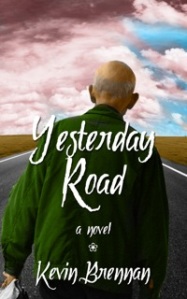I can’t remember when I first came across Kevin Brennan. Perhaps he commented on my blog or I read a comment he made on another blog. Whatever the case, I soon found his site, “What the Hell,” and discovered his book of short shorts Our Children Are Not Our Children. From the first line I was hooked.
Brennan, also author of Parts Unknown (William Morrow), has lived a bit of an unconventional life. He’s rung in the new year in Red Square, performed as a busker in the London Underground, wandered the California desert, and auditioned unsuccessfully for a chance at stardom on reality television. He and his wife live in Petaluma, California.
Brennan’s latest book, Yesterday Road, launched earlier this week. I was lucky enough to snag him for a chat about books, writing and other life lessons.
Q: Tell us a little about your background: Where did you grow up? Did you always want to be a writer? Were you a nerdy kid?
A: I grew up in St. Louis, MO, followed by stops in Newport News, Virginia, London, San Diego, San Francisco, and now Sonoma County, California. I first remember getting the idea that writing might be cool when I was about ten and we did a journalism thing in school. I tried putting out a newspaper in the apartment complex. It never quite got off the ground, but I did have a typewriter on a TV tray in my room and pounded out a few stories about life there. Kid life, anyway.
After that, when I discovered novels, I thought, Now this is cool. Before I actually wrote a whole novel of my own, I guess I probably started a couple dozen of them and gave up after thirty pages or so when I realized I didn’t know how to write a novel. Back to the drawing board.
Was I a nerdy kid? I had a chemistry set and a dissection kit with a frog, a fish, and a crawdad. A real nerd would have actually dissected them, but I couldn’t bring myself to do it, and they dried up in their formaldehyde pouches.
Q: You published your first book Parts Unknown back in 2003 through traditional publisher William Morrow/Harper Collins. Can you talk about that process?
A: I’d had a couple of agents before that, shopped around a couple of other books, so I knew how the process worked. Then, one day, one of the agents I’d queried with Parts Unknown called and very enthusiastically offered representation. Within about three weeks she had sold the book to Morrow — actually called to tell me about it on my birthday, so it really had this “meant to happen” quality.
The best part, to be honest, was the year before publication, when we did all the revision, the galley proofs, cover art — all that good stuff. I went to New York to meet my agent and editor, and it felt like I was toast of the town for a day.
Receiving your printed book is an amazing thing too. Here comes this box with your free copies, and there’s your name on this actual book, with something you wrote inside. Dream-come-true territory.
Q: What have you been doing in the interlude between Parts and Our Children? Were you still writing and publishing?
A: Definitely writing. During that period I had at least three agents, shopped around another three novels, but unfortunately we weren’t able to land a new contract. I think this was mainly because the business was already changing, there was a new paradigm coming in. The head of my literary agency had, mistakenly, it turns out, told me that an author wasn’t expected to produce real sales till his fourth or fifth book, but even as he spoke it seems like that model was already going away. Today, a first book absolutely has to do well enough that the publisher is willing to take a chance on a second.
In any event, I’m sitting on a lot of material.
Q: Talking about publishing, it’s changed dramatically in the 10 years since Parts Unknown released, and many traditionally published writers are heading the self-published route, mainly to control eBook prices and sale. How do you feel about this?
A: For me, it remains to be seen. I think self-publishing offers an opportunity. I’m not sure it will be viable for writers of literary fiction — at least not yet. At the moment it seems tailor-made for genre novels and possibly for established authors like David Mamet, who has stuck his toe in the water. On the other hand, for lesser-known writers, traditional publication is still the ideal way to go because there’s an automatic seal of approval that goes with it, not to mention some degree of promotion. It may not be entirely fair, because there’s a lot of stuff published by big houses that isn’t Pulitzer quality, and there could well be some hidden gems in the KDP shelves. Maybe the line will blur eventually.
Q: What prompted you to write Our Children Are Not Our Children? Did the pieces come to you as a collective or did they feed off of one another?
A: I first put it together as something I submitted to literary magazines. I had the piece called “Baby Teeth” in mind early on, and used it as a jumping-off point to explore insidious kinds of child abuse that — though these stories are enormously exaggerated — tend to harm the psychology of children. I’d heard of a father of three dying on a mountain-climbing expedition, so I riffed on that in “Heading Out.” Someone I knew said she was kept in the closet as a child while her mother went to work; that became “Day Care.” After that, it was a matter of brainstorming, and of playing with a certain tone.
Q: The underlying tension in Our Children, intrigues me. Was this difficult to write? Did you have to hold back from offering the reader too much?
A: That’s where I thought the tone would be important. I kept a distance between the reader and the characters so it would be like viewing something awful but you can’t intervene. It’s like, “If it takes a village, how come we can’t stop this?”
Q: Tell us about your new work Yesterday Road. How did it begin and why did you feel the need to write it? P.S. I love that it has a middle-aged waitress as a central character.
A: It’s interesting that the basics of this book came almost all at once. My first page of notes for it pretty much describes the plot as it turned out, which is really rare! I just liked the concept of an innocent on the road trying to get home, but I injected some irony in that the innocent is an 80-something man with a lifetime’s worth of experience that he can’t remember. Another innocent, a young man with Down syndrome, becomes his guide. There was an interesting switch there, and that gave me the enthusiasm to dig in and finish it.
I also think “going home” is such a powerful theme that it almost writes itself. Add to that the feel of a picaresque, and I told myself I had a fun project that could lead interesting places.
By the way, middle-aged waitresses are underrepresented! Ida makes this book sort of a cross between Alice Doesn’t Live Here Anymore and Of Mice And Men.
Q: The writing style of Yesterday Road is very rich and sensual, at least what I read in the first chapter, and this differs from Our Children. Which style is truer to your real voice?
A: You know, I think it’s a matter of form. When I write a story I find it easier to explore different tones and voices, even different elements like how the page looks (like in the all-dialogue piece in Children called “Car Trip”). But in a novel it’s much harder to maintain an unusual style. The first few chapters might be all right, but when you get into the tough middle of the book you start to think it might not be working. Some writers can pull it off, but for the most part it seems like I gravitate to a traditional tone in novels and stranger stuff in stories.
I also like the idea of reinvention. Why does everything someone writes have to be the same? I’ve been trying pretty hard, as a matter of fact, never to write the same book twice, which, sadly, a lot of writers do.
Q: What do you do in your non-writing time? Job? Hobbies? Shameful TV shows you can’t miss? Dogs/cats you secretly spoil?
A: My wife and I have a small restaurant accounting business, which is so unlike writing that I find it perfect. The two halves of my brain co-exist peaceably. Numbers over here, words over there.
I’m also what I describe as a “bedroom guitarist” because I have no intention of playing in front of people. I’ve written and home-recorded a few original songs and tried my hand at learning some Wes Montgomery and Grant Greene solos, but it’s the ultimate guilty pleasure because it’s just for me.
My wife and I are avid hikers, and we have a special fondness for the Sierra foothills between Sacramento and Lake Tahoe, where we hope to build a house eventually.
Shameful TV? I don’t think it’s shameful, but I loved “Breaking Bad.” I’m growing a little tired of “Mad Men,” and I’ve given up on reality TV altogether, though I once auditioned for “The Mole.”
We have a 20-year-old cat named Nip, and a basket case of a dog named Hitch. Both spoiled.
Q: If you could eat one book, digest it and have it feed your blood, which would you choose?
A: The Joy of Cooking? No. Actually, I was just thinking of a book I read a couple of years ago called The Unfortunates, by English author B.S. Johnson. It’s a book in a box — 25 or so different separately bound sections that are meant to be read in any order the reader wants to put them in, so that the experience is different for each reader or each time a particular reader reads it. I love the idea. It seems to fit our times, with the possibilities of ebooks and flexible narrative structure, even though it was written in 1969.
I do like to play with chronology sometimes in novels. In Parts Unknown, things don’t come to the reader in chronological order, but that was to set up different juxtapositions and help the reader make connections.
So much has been done with fiction that I think it might be time to bend the form a little bit, like Johnson did, so that it reflects how the mind works. Which is, a little chaotically.
Q: Is your next book conceived or outlined? If so, throw us a few tempting tidbits.
A: It’s already written! Believe it or not, it’s sort of a chick lit novel (or women’s fiction? literary comedy?) called “Wish I Were Here.” It’s in the first-person. I hope I pulled it off…
Contact Kevin Brennan:
Blog: What the Hell
Facebook
Twitter: @kevinbrennan520
Read the first chapter of Yesterday Road here.




Reblogged this on What The Hell and commented:
Here’s an interview I did with Cinthia Ritchie, author of Dolls Behaving Badly. You can read my review of it here: http://wp.me/p3sx1Q-fm .
LikeLike
Damn, this was an excellent interview! Sorry it took me so long to get here, but so glad I finally did 🙂
LikeLike
Reblogged this on Year 'Round Thanksgiving Project and commented:
Great author interview. Yesterday Road was a really good book
LikeLike